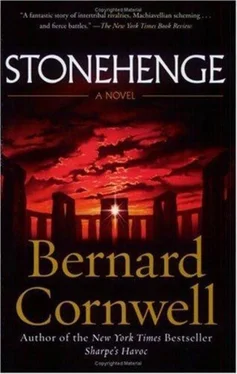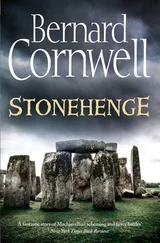But it was not to be. For on the night when the ordeals finished, before Saban could find him, Haragg gave a great cry and died. And Camaban went mad.
Camaban howled as he had when his mother had died. He howled in unassuageable grief, claiming that Haragg had been his father. 'He was my father and my mother,' he shouted, 'my only family!' He drove the slave girls from his hut and slashed himself with flints so that his naked body was laced with blood when he emerged into the daylight. He threw himself onto Haragg's corpse, wailing that the high priest was not really dead at all, but sleeping, though when he tried to breathe his own life into Haragg's soul, the corpse stubbornly remained dead. Camaban turned on Saban then. 'If you had finished the temple, brother, he would not have died!' Camaban was quivering, scattering droplets of blood onto Haragg's body, then he snatched up handfuls of turf and hurled them at Saban. 'Go!' he shouted. 'Go! You never really loved me! You never loved me, go!'
Gundur hurried Saban out of Camaban's sight behind a hut. 'He'll kill you if you stay.' The warrior frowned as he listened to Camaban's howls. 'The gods are in him,' Gundur muttered.
'That was Haragg's tragedy,' Saban answered drily.
'His tragedy?'
Saban shrugged. 'Haragg loved being a trader. He loved it. He was curious, you see, and he wandered the land to look for answers, but then he met Camaban and he believed he had found the truth. But he missed the trader's life. He shouldn't have stayed here as high priest, for he was never the same man after.'
Camaban insisted that Haragg's body would not be taken to the Death Place, but must lie in the new temple's death house and so the corpse was carried on a hurdle and placed between the mother stone and the tallest pillars that still awaited their capstone. The whole tribe accompanied the body. Camaban wept all the way. He was still naked, his body a web of crusted blood, and at times he threw himself to the turf and had to be persuaded onwards by Aurenna who had come from Cathallo at the news of Haragg's death. She wore a robe of grey wolf fur into which she had rubbed ashes. Her hair was dishevelled. Lallic, almost grown now, was at her side. She was a wan and thin girl with pale eyes and a frightened expression. She looked startled when Saban approached her. 'I will show you the stones,' he told Lallic, 'and how we shape them.'
'She already knows,' Aurenna snapped. 'Lahanna shows her the stones in her dreams.'
'Does she?' Saban asked Lallic.
'Every night,' the girl answered timidly.
'Lallic!' Aurenna summoned her, then glared at Saban. 'You have taken one child from the goddess. You will not take another.'
The slaves stayed in their huts that day as the women of the tribe danced about the temple's ditch and bank, singing Slaol's lament. The men danced inside the temple, threading their heavy steps between the unfinished boulders and the emptied sledges. Camaban, some of his cuts reopened and bleeding, knelt beside the body and shrieked at the sky while Aurenna and Lallic, the only women who had been allowed to cross the temple causeway, cried loudly on either side of the corpse.
What shocked Saban was that two priests then led an ox into the temple. Haragg had hated the sacrifice of anything living, yet Camaban insisted the dead man's soul needed blood. The beast was hamstrung, then its tail was lifted so that its head dropped and Camaban swung the bronze axe, but his blow merely glanced off one of the horns and gouged into the animal's neck. It bellowed, Camaban struck again, missed again, and when a priest tried to take the axe from him he swung it round in a dangerous arc, just missing the man, then hacked at the animal in a maniacal frenzy. Blood spattered on the mother stone, on the corpse, on Aurenna and Lallic and Camaban, but at last the hobbled beast crumpled and Camaban drove the axe deep into its spine to end its torment. He threw the axe down and dropped to his knees. 'He will live!' he cried, 'he will live again!'
'He will live,' Aurenna echoed, then she put her arms around Camaban and lifted him up. 'Haragg will live,' she said softly, stroking Camaban who was weeping on her shoulder.
The body of the heifer was dragged away and Saban angrily scuffed chalk dust over the blood splashes. 'There was never supposed to be sacrifice here,' he said to Kilda.
'Who said so?' she asked.
'Haragg.'
And Haragg is dead,' she answered grimly.
Haragg was dead and his body stayed in the sun house where it slowly decayed so that the stench of the dead priest was ever in the nostrils of the men digging the holes and shaping the stones. Ravens feasted on the corpse and maggots writhed in his rotting flesh. It took a whole year for the corpse to be reduced to bone, and even then Camaban refused to let it be buried. 'It must stay there,' he decreed, and so the bones remained. Some were taken by animals, but Saban tried to keep the skeleton whole. Camaban recovered his wits during that year and declared that he would replace Haragg, which meant he was now chief and high priest. He insisted that Haragg's bones needed the blood of sacrifices, therefore he brought sheep, goats, oxen, pigs and even birds to the temple and slaughtered them above the dry bones that became stained black with the constant blood. The slaves avoided the bones, though one day Saban was shocked to see Hanna crouching over the drenched skeleton. 'Will he really live again?' she asked Saban.
'So Camaban says,' Saban answered.
Hanna shuddered, imagining the priest's skeleton putting on flesh and skin, then climbing awkwardly to its feet and staggering like a stiff-legged drunk between the high stones. 'And when you die,' she asked Saban, 'will you lie in the temple?'
'When I die,' Saban told her, 'you must bury me where there are no stones. No stones at all.'
Hanna frowned at him, then suddenly laughed. She was growing fast and in a year or two would be accounted a woman. She knew who her real mother was, and knew too that her life depended on never admitting it, so she called Kilda her mother and Saban her father. She sometimes asked Saban if her real mother still lived, and Saban could only say that he hoped so, yet in truth he feared the opposite. Hanna reminded him more and more of the young Derrewyn: she had the same dark good looks, the same vigour, and the young men of Ratharryn were acutely aware of her. Saban reckoned in another year he might have to place a clay phallus and a skull on his hut's roof. Leir was among Hanna's admirers, and she in turn was fascinated by Saban's son who had grown tall, wore his dark hair plaited down his back and now had the first kill marks on his chest. It was rumoured that Camaban wanted Leir to be the next chief, and most thought that a good thing for Leir was already achieving a reputation for boldness. He fought in Gundur's band and was kept busy either defending Ratharryn's wide borders or in the raids that went beyond those hazy frontiers to bring back oxen and slaves. Saban was proud of his son, though he saw little enough of him for Camaban, in the years following Haragg's death, demanded that the work on the temple be hurried.
More slaves were sought, and to feed them and the tribe more war bands ranged in search of pigs, oxen and grain. The temple had become a great mouth to be fed, and still the stones came from Cathallo to be shaped by hammers, sweat and fire, and still Camaban fretted. 'Why does it all take so long?' he constantly demanded.
'Because the stone is hard,' Saban constantly replied.
'Whip the slaves!' Camaban demanded.
'And it will take twice as long,' Saban threatened, and then Camaban would get angry and swear that Saban was his enemy.
When half the pillars of the sky ring were in place Camaban demanded a new refinement. 'The sky ring will be level, won't it?' he asked Saban.
Читать дальше
Конец ознакомительного отрывка
Купить книгу












